Letter to the Friends of Deir Mar Musa 2021
Letter to the Friends 2021
A broken body announces a glorified one
Deir Mar Musa al-Habashi - Nebek, Syria
San Salvatore Monastery - Cori
Deir Maryam al-Adhra Monastery – Sulaymaniyah
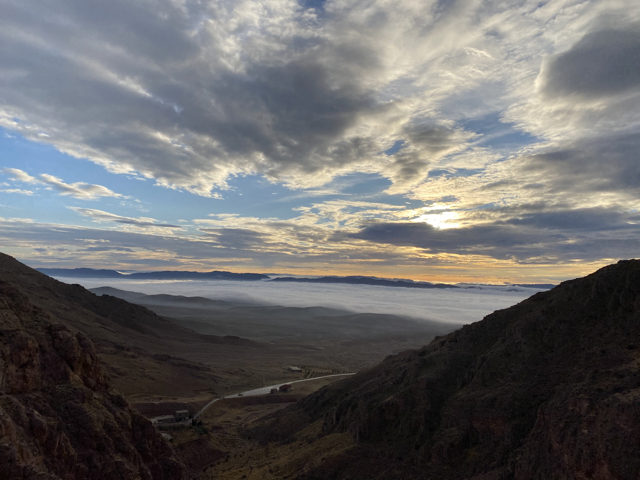
A broken body announces a glorified one
On the seventh of April, I had just arrived in Beirut when I received a call from my village, “Jihad, your mother is ill.” I could sense the presence of an ominous ghost swirling around my tender mother. On the thirteenth of May, she died while praying as I held her hand in mine. The greatest good of creation I knew passed on to the mercy of God Almighty on Ascension Thursday, the feast of Our Lady of Fatima and the first day of Eid Al-Fitr as a result of consequences of the ugly Corona virus. I had always thought about that day, dreaded it, and prayed for how it would come about.
“Verily, flesh and blood cannot inherit the kingdom of God, and corruption cannot inherit incorruption” (1 Cor 15:50). Over and over again, I have pondered the mystery of life, where nothing is as certain as death. I have often wondered how Christ entered the upper room to join his disciples while the doors were closed (cf. John 20:19). The apostles thought he was a spirit, but he showed them his hands and feet and asked them to touch him, and when they remained incredulous, he asked them for food and ate it before their eyes (cf. Luke 24:37-43). We are a people who believe in the resurrection, as the Apostle Paul affirms: as for “the resurrection of the dead, what is sown is perishable, but what is raised is imperishable... what is sown is a natural body, and what is raised is a spiritual body” (1 Cor 15:42.44). This suggests that the “natural” body is a non-spiritual body. If it stops breathing, it dies. As for the soul, it has no body, and therefore it does not breathe because it is all breath. But the Risen Jesus was, and still is, breathing. However, his body is no longer “natural” in the sense that Paul is talking about, but is rather a spiritual body, that is, glorified, and one of the attributes of glory is imperishability and incorruption.
People in today’s world view the body as an idol. In television and internet advertisements, different products are promoted in a consumer market without mercy, where the body is always presented as young, graceful, fresh, attractive, athletic, strong, sexually alluring... and so on. Deep down, everyone desires to never get sick or grow old. Almost no advertisement, even if it is for a car or a refrigerator, lacks a girl wearing the least amount of clothes possible or a young man displaying as many muscles as possible. The body is a cheap commodity in a world where all commodities have become very expensive. Bodies, the bodies of the simple and the poor, are treated as fuel for heating by the powerful, for the benefit of their own bodies. Wars harvest the bodies of millions and do not take on the burden of their souls. Too many people live to please their bodies at the expense of their souls – their own as well as the souls and bodies of others.
I spent 33 days with my ailing mother, during which time her condition gradually deteriorated until she lost her concentration, her memory weakened and her movement diminished, and so she needed someone to serve her in everything. I haven’t spent that much time with my mom in over two decades. I sang for her and with her, fed her, satiated her thirst, gave her medicine, dressed her and cleaned her, washed her feet reverently and bathed her with modesty, combed her silky, silky hair… For a month, I worked to give her what she had given me for many years. We laughed and joked, and in moments of fatigue and for a lack of sleep, we quarrelled, and out of despair and exhaustion, I even raised my voice in her face, thinking that I might help her when she was refusing to eat, for example, or to prevent her from doing something that might hurt her and increase my fatigue… I asked her for forgiveness for that, so she forgave me and asked God to forgive me and be pleased with me. I told her over and over how much I loved her to the point of redundancy, and each time, despite her pain and until her final breath, she answered me in her Lebanese accent, “I love you too”. I told her repeatedly how much I miss her, and she replied sweetly, “I miss you too.” I cried her alive as I watched her fade and vanish, and no longer fearing the danger of infection, I didn’t prevent my lips from kissing her soft hands, and quenched my heart’s thirst by kissing her forehead and cheeks. We prayed together and thanked God for everything. She assured me that she was not afraid of illness and death... And she breathed her last breath while repeating, “With your suffering, Jesus”. Her attitude, patience, and submission were a lesson in faith for me, just as, back in my childhood, she had taught me to pray. I watched her surrender to the Most Gracious One, and heard her calling out to him, “Lord, save me, O Jesus, take me, O Virgin Mother, I seek solace in you.” I witnessed her submitting to her Creator, waiting for “God to be all in all” (1 Cor 15:28).
My mother’s weak body taught me many things, the first of which is the vanity of the world. It taught me patience and compelled me to humble myself before its greatness and the greatness of its Creator. My mother’s naked body helped me face my shame and confusion before a woman’s body, and the problem of my relationship with it as an Eastern man and as a monk dedicated to chastity. Her small, worn-out body revealed secrets to me of which I was ignorant. It reconciled me to the body of a woman, which I had never seen naked but had long desired and abstained from respectfully, and had been curious to know and discover, though in my monastic consecration I chose a different mode of relating to the body, my own body first and the body of a woman, second.
The experience with my sick mother freed me from the taboos imposed upon us by a strict society and the wrong face of uncritical religious education. It showed me the sanctity and beauty of life that does not disappear with old age and which disease does not abate, and introduced me to the sweet scent of Christ that leads us from life to more life (Cf. 2 Cor 2:15-16). The Corona epidemic has imposed painful restrictions on us and caused severe harm to many peoples and countries. It is, however, a golden opportunity to learn what is important and what is essential. The question is: Have we learned something? Has all of humanity gotten the message? Whatever the case, let each and every one of us enjoy those we love, let us serve our parents and grandparents, let us express our love to them before it is too late. Nothing is worth quarrelling over with anyone, so may we not let pride prevent us from seeking forgiveness and reconciliation with those we have wronged, and may we not be ashamed or put off the words “I love you”, even without occasion.
I arranged my mother’s few belongings – some worn-out clothes, a hair comb, nail scissors, eyeglasses, a few small flashlights, a lighter... and so on. When my mother died, she had nothing but a small wad of money that I had “tucked” into her wallet months before… Her poverty matched that of hermits, and almost exceeded it. I was ashamed of myself in front of her, I who vowed poverty. How proud she was of my consecration, for even though she had forgotten many things and people, she still said to those around her sick bed, “My son is a monk at Deir Mar Musa.” She was attached to God Almighty, who set her free, “Where the Spirit of the Lord is, there is freedom” (2 Cor 3:17).
Thank you, Mama, your son, Monk Jihad.
The most important thing that happened in our lives this year was the monastic chapter meeting, which had been postponed from September 2020 to the spring of 2021 due to the circumstances imposed by the Corona epidemic. Our electoral session was held at the mother monastery between May 18 and June 4 in the presence of all members of the professed community. It was much more than a mere routine annual appointment; it constituted an important, pivotal episode in the history of our nascent order, and we would be right to call it a quasi-foundational chapter, during which we re-orientated our ship towards the port of safety. So, with contentment and joy, we chose to move forward together in our monastic consecration on the basis of our three priorities – prayer, manual work and hospitality – attracted by the horizon of harmony, friendship and mutual appreciation with Islam and Muslims, whom we love in the name of Christ, as he loves them. Overall, it was an opportunity for prayer, contemplation, and shared presence before God, in awareness of our weaknesses and limits, and was a space for a transparent and frank – even if at times painful – review of our personal relationships, which had previously gotten strained for a number of reasons, and thus, an occasion to renew our trust in each other and receive God Almighty’s trust in us. In addition, we re-examined our concrete educational, humanitarian, and emergency relief projects, and on the ecclesial level, our relationship with the universal and local Church, including that with Middle Eastern Christians, both those who have remained in the East and those who have emigrated to the four corners of the earth. We reflected at length on the heredity left us by the founder of our community, Father Paolo, and on a method to activate our special charism in religious dialogue, and thought about what the Church needs today, what the challenges are, and where its centres of strength and weakness lie, in short, what is God’s will in our lives now.
The chapter meeting resulted in the election of fra Jihad Youssef as the abbot of the Community, and fra Jacques Murad as administrator and vice-superior, in the presence of the old friend of the Community, Archpriest Rev. Michel Naaman, who counted the votes and documented the event ecclesiastically. The monastic Community expressed its deep gratitude and sincere appreciation for the effort made by Sister Houda as superior of the Community, not only over the three and a half years since her election in September 2017, but from 2012 to date. She served the Community with love and sincerity according to her capabilities, limits and talents, and carried a great burden on her shoulders, may God reward her with the crown of glory and spiritual joy. We reaffirmed the role of laity in the Church in general and in our Community in particular, and reflected on how to develop relationships with our friends from different churches and religions and various spiritual and cultural affiliations, both religious and non-religious in different parts of the world. The Community is especially grateful to the associations of its close friends in Italy, France and Switzerland, who have accompanied us with love and generosity, attentive to our material and moral needs. Here, we will not leave without mention the Christian organisations, both Catholic and otherwise, as well as the official and non-government organisations that have supported us for years. You have become partners in the commitment to serve peace and justice and search for the common good for all humanity.
After the Chapter ended, the monks and nuns re-established themselves in the Community monasteries, and we are now distributed as follows: Jacques, Houda, Yausse, Jawdat and Jihad at Deir Mar Musa - Syria, Deema and Carol in the monastery of San Salvatore - Cori, Jens and Friederike in the monastery of the Virgin Mary - Sulaymaniyah. The sisters expressed their willingness to take turns spending time at Deir Mar Musa so that Sister Houda would not remain the only nun there. This year, God blessed us with the arrival of two people who began a period of discernment at Deir Mar Musa. Our sister Denver Michelle Beattie, who has been an Italian friend of the Community for several years, began her postulancy on the twentieth of last September. Fr Mario Foglia Parrucin, a priest from the diocese of Biella in northern Italy (Piedmont), arrived on the ninth of October to begin a year of “exchange between Churches”, as his bishop, His Excellence Rev. Roberto Farinella explicitly expressed in the agreement made on his behalf with the Patriarch of our Syro-Catholic Church. May God grant them both discernment of His will. We will continue to pray for priestly and monastic vocations for the whole Church, always remembering that the vocation common to all people is that of holiness.
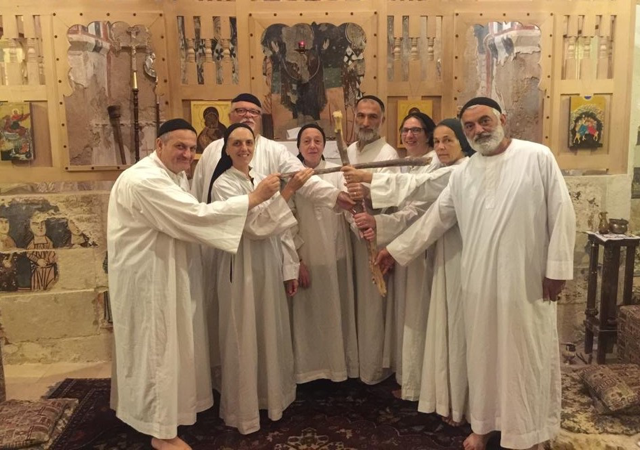
Jacques spent this year at Deir Mar Musa praying, doing office work and in the kitchen where he made good jams, like his special rose marmalade in the Aleppian tradition. He provided spiritual and priestly service, both in the Community and outside of it in parishes and monastic groups that asked him to do so, in Syria and Iraq. At the beginning of September, he went to Italy to follow up on medical treatment and renew his residency papers, in addition to participate in some meetings and activities with friends in Europe. The spiritual and prayer life at the San Salvatore monastery is imbedded with greater richness when a priest of the Community is present there. Jack will return, God willing, to Deir Mar Musa to spend Christmas together, and to take on his new role.
Houda served as the group’s superior with complete honesty until she handed over the task to the new superior. She then spent a period in Cori and now lives her monastic life with simplicity and generosity. She takes care of the work entrusted to her and practices it with ease, especially after she has been freed from the weight of responsibility. Her presence at the monastery is characterised by spontaneity and simplicity, with faithfulness in taking care of many works, both in the office and daily life. Houda returned to the practice of drawing, her paintings are simple and deep after meditation and prayer. We hope that Houda can take time to rest after serving these long years and devote more time to receiving people, listening to them and helping them spiritually.
Jens continues to take care of the monastery of the Virgin Mary in Iraqi Kurdistan. In Jens, we find seriousness not only in the direction of the various projects that will be mentioned later, but in his faithful apostolic service for the benefit of his “flock” of Christians, both displaced Iraqi parishioners and particularly foreigners – Asians and Europeans working in Sulaymaniyah. He insisted upon spending Easter with them before coming to help prepare and attend the chapter meeting at Mar Musa. Jens goes from time to time to Europe on behalf of the Community and also to visit his aunt, may God grant her long life in Berlin.
Deema was present at Deir Mar Musa during the first half of the year, during which time she performed several tasks, including the competition with Jack for the preparation of marmalade (specialising in delicious apricot in the Haemesian tradition). She also organised the monastery archives that had been stacked in cartons for years, working on this project alone until late at night. With the help of Jens and others, she oversaw the rearrangement of the library books in their correct places, since they were still awaiting the moment to be taken back out of boxes. Now we can choose a book and read it. Deema went to Cori in mid-August to begin her scientific research journey towards obtaining a doctorate from the Gregorian University in Rome.
With great joy and generosity, Yausse launched into his labour in the candle and rosary workshop. He provides the candles the monastery needs, and also fulfills the needs for candles and prayer beads of other Catholic and Orthodox monasteries. He expanded the scope of his work in this field to give job opportunities to several poor young women in Damascus who now help him prepare handicrafts after he taught them how to practice the craft perfectly. Now he faces the big challenge to quit smoking, let’s all pray for him.
The greatest credit for the organisation of the dialogue method of our chapter this year goes to Carol, and we all sensed the talents God has given her, in particular her ability to harness her expertise in psychology in favour of creating a relational dynamic that helped everyone confront themselves and go beyond themselves to encounter the other, listen to him or her, and try to work well. After a brief visit with her sick mother in Lebanon, Carol returned to Cori and is now enthusiastically pursuing her PhD thesis in Islamic Studies on “God’s Call to Man in the Holy Qur’an".
Friederike went to Germany several times to stay with her sick mother, each time departing from a different monastery. Taking care of her mother is an evangelical duty that this sister does in the name of all of us. After the chapter, Friederike remained at Deir Mar Musa until about the end of July. Her presence, careful and attentive to each brother and sister, helped activate dialogue sessions to continue what we had started during the chapter. She is now at the Virgin Mary monastery in Sulaymaniyah collaborating with Jens to manage the life and activities of the monastery and to follow the theatre workshop there, which has seen remarkable progress since its several years of inception.
Jawdat, in his second year of initiation, shows great curiosity to learn all things new, and tries to organize his spiritual and monastic life with the help of Fra Jacques. He is showing greater development in his initiative to collaborate and build relationships with others than before, which bodes well. These impulses call for refinement and perseverance in order for this brother to pronounce his vows in the Community. With great enthusiasm and joy, Jawdat set out for the city of Aleppo at the beginning of October to begin an experience that will last for three months, subject to renewal, under the supervision of the Marist Brothers, in which he participates in their many educational activities, including caring for the elderly and those with special needs, serving the poor, and working with youth. We hope that this healthy, rich atmosphere, in which Jawdat can meet other young people his age, will contribute towards guaranteeing a space for his maturity to develop, and reinforce the natural human experience that was stunted by the tides of war in which this brother’s generation grew up, may God grant him success.
Jihad continued his commitment as administrator and vice-superior until he was elected Abbot after Sister Houda. He remained at the bedside of his ailing mother, who was loved by all members of the Community, thanking God for his blessings. Over the summer, Jihad worked with our friend Denver, who helped him honestly and generously proofreading the text of his doctoral thesis in English in Biblical Theology on the eleventh century Commentary on Deuteronomy by the scholar Abdullah Ibn aṭ-Ṭayyib. He hopes to defend the thesis at the Gregorian University in Rome at the beginning of 2022, God willing. In addition, he continues to organise and supervise the projects of the Community with the help of his brothers and sisters in Syria. We ask you to pray for him in his new mission.
Deir Mar Musa al-Habashi - Nebek, Syria
This year, again, unfortunately, we were unable to receive visitors as we would have liked to, as a precaution against the Corona virus infection and due to the inability to sterilise public spaces, especially the church itself. We have limited our hospitality to some brief, pre-arranged visits for small groups of 3-4 people, and in special cases, overnight visits for one or two people at the most. At the time of writing this letter, the covid situation in Syria remains difficult. There is a remarkable increase in cases during October and November. We ask everyone to take great care, and ask God for relief and mercy.
We are still waiting with prayer, patience and hope for the arrival of a new official Archbishop in our diocese. His Beatitude the Patriarch Mor Ignatius Joseph III Younan in the month of October appointed His Excellency Archbishop Rami al-Qabalan as Patriarchal Administrator, in anticipation of the new Archbishop. The Community thanks His Beatitude the Patriarch for his direct interest during the vacancy of the Episcopal See in the diocese. The Head of the Shepherds visited Deir Mar Musa al-Habashi in mid-June and met with the entire monastic Community and celebrated the Divine Liturgy in the church of the monastery and he blessed the monastic Community, underscoring the common consecration in the service of the Kingdom.
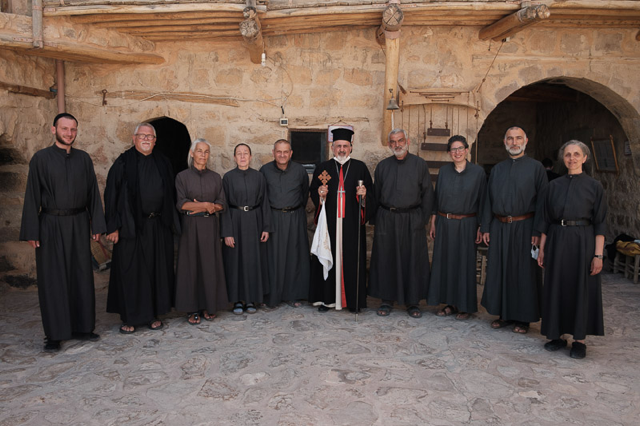
(His Beatitude the Patriarch Mor Ignatius Joseph III Younan visiting Deir Mar Musa al-Habashi)
The Community was honoured on the 2nd of November with a visit by His Eminency Cardinal Leonardo Sandri, Prefect of the Congregation of the Oriental Churches in the Vatican, and His Eminency Cardinal Mario Zenari, Apostolic Nunzio at Damascus. The visit was warm and informal and through it, we felt the paternal care that the Holy See shows for our Community. Together, in the presence of the monastery employees and work partners, we prayed for our founder Fr Paolo and for all those who have been kidnapped and are missing, and for peace in Syria and the world. After a caffè and mate break, the two prelates blessed the Community and continued on their way with their respective secretaries to Damascus
https://www.vaticannews.va/it/vaticano/news/2021-11/sandri-siria-viaggio-buoni-samaritani.html
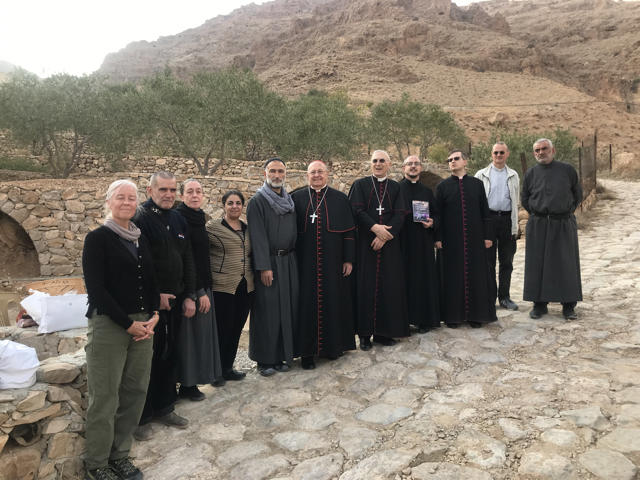
(His Eminency Cardinal Leonardo Sandri and His Eminency Cardinal Mario Zenari visiting Deir Mar Musa al-Habashi)
We carry forth our usual projects, and there are new ones.
The music school is progressing, and we participated in the “Peoples Orchestra” initiative of Rome, made up of five orchestras (Argentina, D.R. of the Congo, Papua New Guinea, Italy and Syria), playing a piece of music entitled “Canto Prossimo”, composed to accompany the prayer to God the Creator recited by Pope Francis in his “Fratelli Tutti” Encyclical. Some members of the orchestra visited the Damascus Opera House, where the director welcomed them and encouraged them to cooperate with the opera and build a friendship with it.
https://casaspiritoarti.it/it/progetti/la-rete-delle-piccole-orchestre-dei-popoli
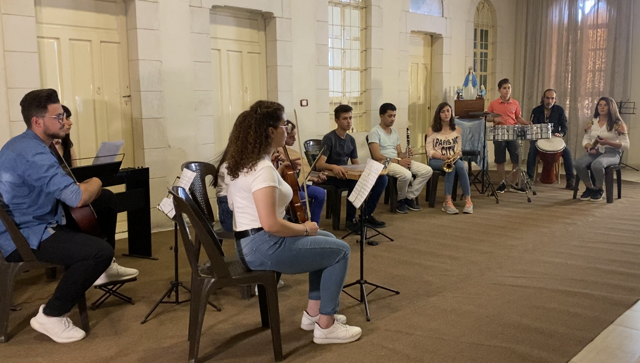
As for the al-Qalamoun Kindergarten, it grows from good to better in all respects, and as usual, the registration requests greatly exceed the kindergarten’s physical capacity, so we hope to be able to complete the construction of the new complex (Kindergarten/Pastoral Centre) soon in order to accommodate the largest possible number of children. The success of the kindergarten has prompted many people of Nebek to demand that we open an elementary school, but we know our limits and thank God for them.
Under the supervision of Adib, work continues in our publishing house on some important texts from lectures and dialogue seminars that took place at the monastery when Fr Paolo was still with us before the war. These are being prepared for print and are still waiting for someone to support them financially.
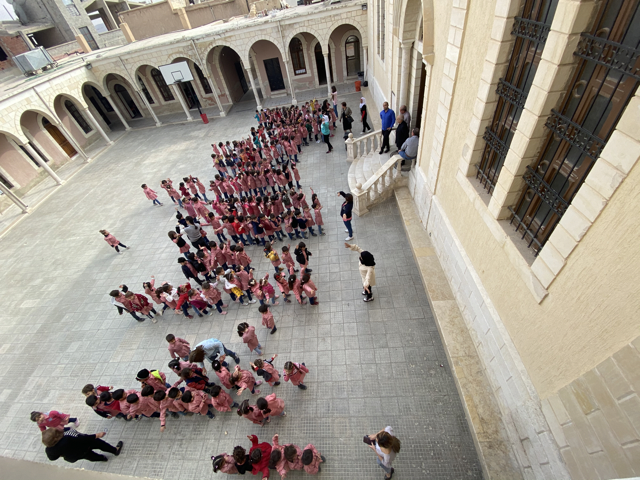
The need for various forms of medical aid constantly increases, not to mention the need to help sustain unreasonably expensive cancer treatment costs. We continue in this field to the extent of our capabilities and the generosity of our benefactors – may God reward them with good.
In addition, we continue our commitment to help approximately forty-five male and female students to study in Syrian universities in Damascus and Homs, contributing to their transportation expenses or room rent, university expenses such as books and lectures, and so on. This project corresponds to the help we provide to some university students so they could obtain scholarships to Italian universities, with the help of several friends: university professors, benefactors, associations of friends, NGOs and others, and religious communities and families who receive students in their homes and convents. We thank everyone for their support, hoping that these young men and women will be able to build a much-needed scientific future in Syria and in the world.
At the beginning of October, we resumed helping some children with medical care at the “Bambino Gesù” hospital directly affiliated with Pope Francis in Rome. In addition, thanks to God and the solidarity of our generous friends, we were able to provide a contribution towards basic heating to approximately 350 families from Qaryatayn (displaced families) and Nebek as well as other scattered areas, according to our awareness of poverty and need.
This year, our vegetable garden in the valley of the monastery was an abundant source of vegetables, including tomatoes, zucchini, cucumbers, peppers and squash. We were able to prune all of our olive trees well again after being unable to do so for several years due to an unavailability of experts. As for the olive season, though production was scarce, the quality was excellent and we were able to store provisions of green and black olives to last the year. In this context, we began to expand the olive orchard planted along the edges of our fields on different levels (terrace farming), by building stone walls that increase the space below the trees to facilitate the harvesting of the crop without exposing labourers to the risk of falling to the lower fields.
In and of itself, agricultural work is important, regardless of the quantity of produce it renders, and taking care of nature carries its own human and religious symbolism and environmental and aesthetic value.
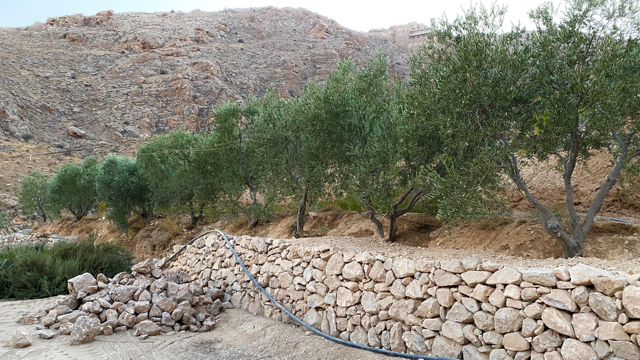
One of the main issues that concerns us is the location of the nearby landfill of the city of Nebek, which lies along the monastery road and has expanded at random over recent years due to war, neglect, and a lack of serious management and financial capabilities. We have repeatedly tried to alert the responsible authorities and asked for help from the official state departments, but to no avail. Finally, cooperation began between a local civil initiative called “Together Nebek is More Beautiful” (TNMB) and the municipality of Nebek, and Deir Mar Musa participated in this initiative morally and materially according to our ability. So far, the result has been excellent. The waste scattered over vast areas has been collected and dumped in a place designated for it. The road leading to the landfill has been asphalted to facilitate access to it for garbage trucks. Dozens of trees have been planted in the former dumping sites to form a green space. What is important in this matter is a follow-up mechanism that will ensure that efforts are not lost in the wind. A word of thanks is not enough for the TNMB initiative, since the greatest credit for the success of this endeavour goes to them.
Our Community would not have been able to carry out all these projects without the presence of a working team of partners, made up of people who have spent most of their lives working with the monastery, such as Amin, Marwan, Hussein, Abu Riad, Nicola, Youssef Hanna, Adib and Diab as well as other new employees. God bless them all.
Our friend Youssef Bali has entered his sixteenth year with us, and he is still praying, working and “serving the Lord” as he likes to say about himself. This year is also characterised by the presence of Joseph from the Valley of the Christians since the month of July and until God wills. Joseph helps in the work life of the monastery, especially with some handicrafts, maintenance, and matters that require a good “mood”, and he adheres beautifully to a life of prayer.
Last but not least, we introduce Dynasty to you, a beautiful and delightful cat, admired by everyone, including Sister Houda, and who attracts the attention of both the monastery’s residents and visitors. It is a skilled hunter and causes no trouble. We can consider it a monk with only two vows, poverty and obedience, because we absolved it of the vow of chastity.
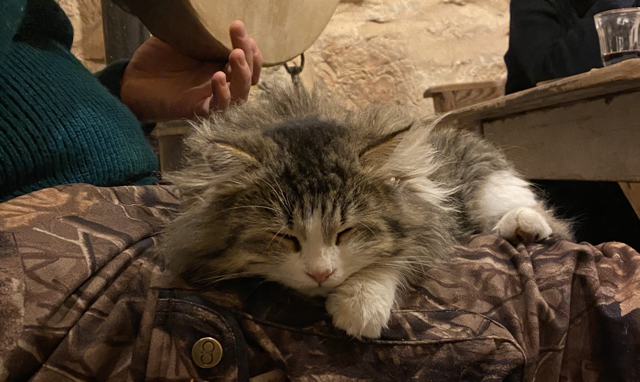
At the request of the ecclesiastical authorities, responsibility for the Mar Elian monastery in Qaryatayn was transferred to the Diocese of Homs, Hama, Nebek and its territory of the Syriac Catholics, so our community has ceased to be responsible for it now for about a year.
San Salvatore Monastery - Cori
Restoration work at the monastery has stopped due to the complications caused by the Corona epidemic. We would have liked it to have been completed during the chapter period while all the members were in Syria and the monastery was empty, but things took a different turn. The spring Marian Muslim-Christian meeting “Together with Mary for Peace and Co-existence” and the summer “Open Doors Week” did not find their place in the life of the monastery this year unfortunately. Due to the pandemic, the normal activities of the monastery were limited to those that could take place online, including the weekly Saturday evening prayer, and an Islamo-Christian meeting on the fourth of February for the first International Day of Human Fraternity marking the Abu Dhabi encounter between Pope Francis and the Grand Imam of al-Azhar, Ahmed al-Tayeb. For the summer of 2022, we are organising an “Open Doors Week” that we hope to be able to hold in July or August, God willing.
It is important to say that there are now at least three Syrian families – both Muslims and Christians – residing in Cori, as well as the family of Emma and Peter, dear British friends who were married and baptised both sons in Cori, and who have now bought a summer house in the village to stay close to the Community. This makes our bond even stronger with this charming town and its generous people. Also, the care for us of His Excellence Rev. Archbishop Mariano Crociata as sons and daughters in Christ increases our conviction that God has blessed our presence there and we ask Him for the grace to make us worthy. We hope that the impact of the epidemic ends as soon as possible so that we can freely live our vocation as a prayerful Community for Islamo-Christian friendship in Europe, and our presence there not merely be a student presence.
The restoration work on the church slowly resumed at the beginning of October, and we hope that this phase will be completed as soon as possible, enabling us to use the church after a decades-long hiatus. This will also open the way for private initiatives to restore the frescoes, as was the case with the mural paintings “Our Lady of Carmel” and “The Circumcision”.
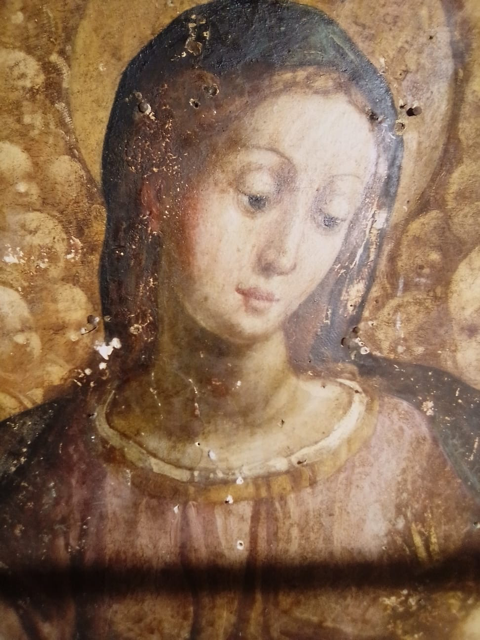
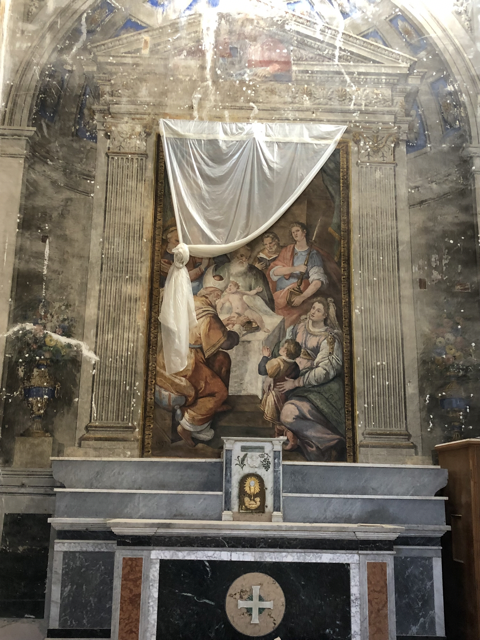
In Cori, there has been a change in pastoral appointments. Our monastic Community sincerely thanks don Angelo Buonaiuto, who was our parish priest for ten years, and his assistants, don Giovanni Grossi and don Leonardo Chiappini, for the support, friendship and cooperation they have shown us, and we ask God to grant them success in their new parishes. We also pray for the new parish priest, don Giampaolo Bigioni and his assistants, don Alessandro Aloè and don Romano Pietrosanti, who will continue his service in Cori. We hope that we can easily weave bonds of friendship and cooperation for the glory of God and common good of all.
We share with you the pain of our loss on earth, in the month of January, of don Ottaviano Maurizi, honorary member of our Community. For many years, he was a father, friend and guide to us, allowing us to grow deep roots in the town of Cori. We are however happy to have gained an intercessor in Heaven.
Deir Maryam al-Adhra, Sulaymaniyah
At our monastery in Sulaymaniyah, a nucleus working group was formed to manage things well, even when fra Jens is absent. We look forward to developing this core and creating an association of friends and laity able to pursue activities and projects in the event that the Community is no longer able to secure a continuous presence throughout the year.
As part of the activities of the “Dangakan” (Voices) initiative, we continued language lessons in Arabic, Kurdish and English for nearly 100 young people and adults. Also, 173 boys and girls participated in summer courses, which included Arabic, Kurdish, and English languages, as well as mathematics and games to develop social and technical skills. While in “Kaneh Kawa” sub-district, 103 boys and girls participated in similar lessons. In the areas of “Kaneh Kawa” and “Kop Tapeh”, we led literacy lessons for 40 people who, for one reason or another, had not gone to school.
At the beginning of the summer, the theatre team performed “Letter to the General”. The text was written by the group leader Radwan, drawing inspiration from three different books. The result was the best show in the history of the “Sabun Karan Theatre Group”. Collaboration continues with the director Stefano Ottini, Paolo Acado and Sister Friederike to pursue the group’s project, making visits to refugee camps and teaching children some theatre techniques.
“The Forum” continued to present “Reading Circles” and four books were discussed with the participation of at least 30 people who were able to express their opinions and provide poetic texts. Musical accompaniment added a special atmosphere to the meeting. The children also had their share of the “Reading Corner”, where they were encouraged to read books in groups of 5-6 children. We tried to provide books that they might like in Arabic, but we suffer from a lack of children’s books in Kurdish.
This summer, we began discussing the idea of dialogue seminars with a group of professors of Islamic religious sciences at the State University of Sulaymaniyah. The proposed topics vary from the roles of men and women in society, and minorities and the majority, to religious dialogue topics.
At the beginning of September, we formed one of the “Jesuit Worldwide Learning” (JWL) centres and hosted two of their courses, becoming their largest partner in Iraq. We hope to attract more students next year. www.jwl.org
We renovated the lounge on the ground floor to deal with the extreme humidity problem in it. The most important work, however, has been the restoration of the church, which has undergone several structural changes in the past, and we want to return it as close as possible to the original. We hope to complete the work at the beginning of next year.
Since September 2019, we host four Indian nuns who study Arabic and Kurdish in preparation to carry out their mission in a home for the elderly and a school in the city of Kirkuk founded by the His Excellency Archbishop Youssef Toma. Last year, the nuns were housed on the first floor, which was the monastery’s library. This year, they are now residing in the new section for nuns, and the floor where they used to live will be turned into an office that can accommodate 5 or 6 people, and the library will be moved to the second floor.
Our dear friends, we thank God Almighty for His great love. We thank you all for your gifts, large or small, as they are in any and every case generous, whether sent to us directly or through the associations of friends with whom we have ties. Your tangible solidarity strengthens us every time and allows us to move forward in our daily lives and to stand by people in need. With your donations, you contribute to the preservation of dignity and practice of mercy. We would like to thank each of you in your own name, as we should, dear friends of the whole world, for your spiritual, moral and material support. However, due to logistical difficulties and a lack of detailed addresses, this simply becomes impossible.
Those who read our letter last year will note that this section is almost identical to what we wrote then. The economic situation in Syria continues to worsen and the reasons for this are many, some internal, such as favouritism and corruption, and some external, such as international sanctions and the Caesar Act, though perhaps we should call it the Act of the Pharaoh, who became tyrannous because no one stood up to him. Work is scarce and one job is not enough to raise a family, not even below decent living standards. People still suffer from a lack of electricity and basic materials such as gas and diesel used for heating and to operate factories, including bakeries. And the wait time in the bread queue in front of the public bakeries to buy the “bread of the poor” is still long. The difficulty of obtaining medical treatment and the high cost of medicines continues without stopping. We know the father of a family who is offering his home and land for sale in order to pay the debt of his daughter’s medical care, and many like him want to save the life of a parent due to a malignant cancer, need for dialysis, or… the list goes on. Despite this, those who go to the private hospitals, buy bread, gas, diesel and benzine on the “black market”, which they call “the free market” but which is, in fact, a mafia “slavery market”.
We will not tire of praying for peace and justice throughout the world and for Islamo-Christian friendship, as well as for a possible universal brotherhood that unifies everyone from different religions and affiliations, religious and otherwise. We work with our brothers and sisters from other Churches to bear witness to the Gospel, which transcends all affiliations, even ecclesiastical ones that have been absolutized by historical divisions based on obsolete foundations. We ask God to demolish these foundations and to replace them with the rock of unity. We are conscious of our limits and know that the only way to widen them is the “other”, especially the poor. The more we open up towards them, the more we grow.
We wish you all a glorious Christmas and a new year filled with peace, spiritual consolation and joy.
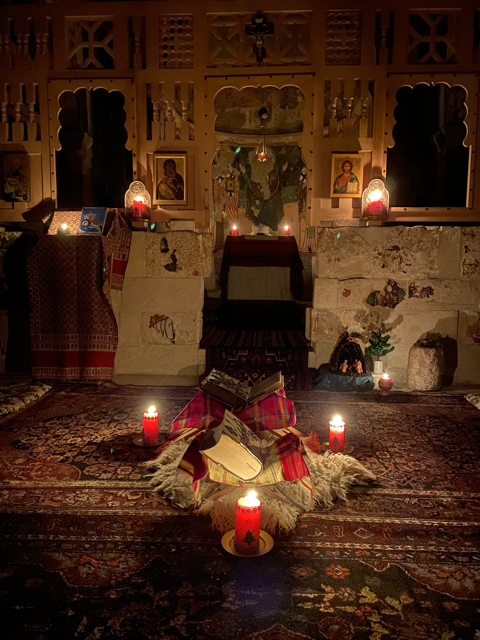
You can use one of the following choices, according to your preferences, for your money transfer:
MAGIS (Italian Jesuits Association: https://magis.gesuiti.it/)
Bank Account:
IBAN IT61E0501803200000011016169 - SWIFT: CCRTIT2T84A
Always indicate “Mar Musa” as purpose of the money transfer.
(in Italy the tax deduction is possible if you donate through the Magis).
Our Association AMICI DI DEIR MAR MUSA.
Bank Account:
IBAN: IT34 K 05387 03206 000001908336- SWIFT: BPMOIT22
Please, never mention Syria in your money transfer otherwise the donation will be blocked.
You can inform the Community (fr.jihad.youssef@gmail.com) or the “Association Amici di Deir Mar Musa” (amicideirmarmusa@gmail.com) of your donation, to permit to thank you - as we wish -in time.).
For a specific communication related to your donation please write to: amicideirmarmusa@gmail.com
The al-Khalil Community of Deir Mar Musa
December 2021
